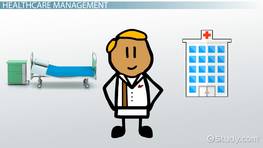Explore Healthcare Administration
Healthcare Administrator Courses
Healthcare administrators perform many functions and must be informed and up-to-date on a number of subjects related to the medical profession.
Explore our full library of healthcare administration courses:
Health 301: Ethical & Legal Issues in Healthcare
Health 302: Health Services Policy
Health 303: Healthcare Organization & Management
Health 307: Healthcare Delivery Systems
Health 308: Healthcare Quality & Outcome Measurement
Explore our full library of healthcare administration courses:
What is Healthcare Administration?
Health, or healthcare, administration is the management profession that provides direction and support to the many institutions that oversee the delivery of health services to individuals, and the various services, units, and divisions that make up these institutes. As such, healthcare administrators and managers can be found at work in hospitals, urgent care clinics, private medical practices, hospices, and other medical organizations, as well as at medical equipment and pharmaceutical companies. They can be found at every level of these health services institutions, from senior- to lower-level management. No matter the level they serve at, health administrators are tasked with making important decisions that affect the organization and its ability to work efficiently and provide quality healthcare to its patients. This may be through the introduction of new technology, raising financial resources, the hiring of new doctors and nurses, deciding which services will be maintained, added, or removed, and so on. Many times these decisions are based on how the organization or unit as a whole measures up to performance targets that healthcare managers have set for those under their supervision.
As in any profession, health administrators plan by setting targets and priorities, organize their areas and the hierarchy of reporting, staff and maintain their workforces, control staff performance and activities, direct action through effective communication and leadership, and make decisions based on careful consideration of the possible benefits and disadvantages of taking particular action. In addition to these general aspects of administration, healthcare managers must also keep in mind the quality and efficiency of patient care, the needs of their immediate and extended communities, changes in government plans and laws regarding healthcare, and reimbursement by and availability of various insurance companies. The level of complexity at which hospitals and other medical care centers operate ensures the need for competent healthcare administrators who can oversee day-to-day operations and allow doctors and nurses to focus on their own areas of expertise.




